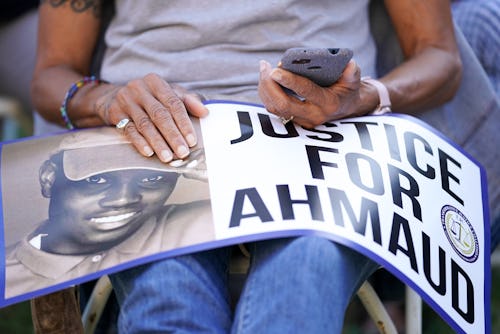The trial over Ahmaud Arbery’s death is off to a complicated start
Juror selection controversy and the validity of “citizen’s arrest” have defined the early days of the trial.

This upcoming February will mark the two-year anniversary of Ahmaud Arbery’s killing in Brunswick, Georgia. His death is seen by many as a modern day lynching, given that he was killed after allegedly being followed through the suburban neighborhood by three white men. Now, Arbery’s killers are officially on trial for murder, and people nationwide are watching with bated breath. With the case already plagued by early controversy surrounding its jury selection, many are curious about what decision will come.
On Feb. 23, 2020, Gregory McMichael; his son, Travis McMichael; and their neighbor, William Bryan, stopped Arbery while he was on a jog. Video captured on Bryan’s cellphone showed Gregory and Travis shooting Arbery three times in the street. Later, the two would justify their actions by claiming they thought Arbery was connected to a series of local break-ins, although reports showed no burglaries had been reported there since January. The older McMichael was formerly an investigator for the local district attorney’s office.
After video of Arbery’s shooting leaked online, the three men were indicted by a Georgia grand jury on nine counts, including malice murder, felony murder, and aggravated assault. Per The Washington Post, if convicted, each of the men face a minimum of life in prison with the possibility of the death sentence.
Although the trial only began Monday, it has already faced controversy due to its jury makeup: Only a single juror is Black, while the other 11 are white. Prosecutors tried to stop defense attorneys from striking potential Black jurors. But according to NPR, despite Judge Timothy Walmsley acknowledging “intentional discrimination in the panel,” he couldn’t reinstate anyone who’d been dismissed.
“[The defense] have been able to explain to the court why besides race those individuals were struck from the panel,” Walmsley said. On Twitter, AJ+ reported that Arbery’s aunt referred to it as “another of the injustices that we see here in Glynn County.”
In any trial, the racial makeup of a jury is no small thing. Angie Setzer, a senior attorney for the Equal Justice Initiative, told NPR, “Studies have shown that racially representative juries engage in a more thoughtful and deliberative fact-finding process. Studies have shown that racially representative juries are also better able to assess the reliability and credibility of witness testimony.”
Plus, it’s just off to have a trial where race and anti-Blackness plays such a key role, but the fate of Arbery’s killers is basically left up to white people. While some may want to ignore the white supremacy at play here, it’s hard to bypass that investigators previously said Travis McMichael used a racial slur after he shot Arbery.
Although the trial is in its very early stages, the defense is expected to build its case around claims that the trio were defending themselves and making a citizen’s arrest, as was then allowed under Georgia law. NBC News reported that attorneys for the McMichaels stated Arbery threw punches and tried to grab Travis’s gun.
However, that defense might have run into a problem on the trial’s opening day, when a former officer testified that Bryan said they weren’t making a citizen’s arrest at all. Per NBC News, Ricky Minshew, who was the first police officer on the scene, told the court that Bryan never mentioned pursuing Arbery because of burglary, assault, or any other crime. On Tuesday, a similar story was told by Jeff Brandeberry, the officer who was assigned to interview Gregory McMichael at the scene. Brandeberry told the prosecutor “no, ma’am,” when asked if McMichael ever said they had been trying to make a citizen’s arrest — the same words Minshew had used Monday.